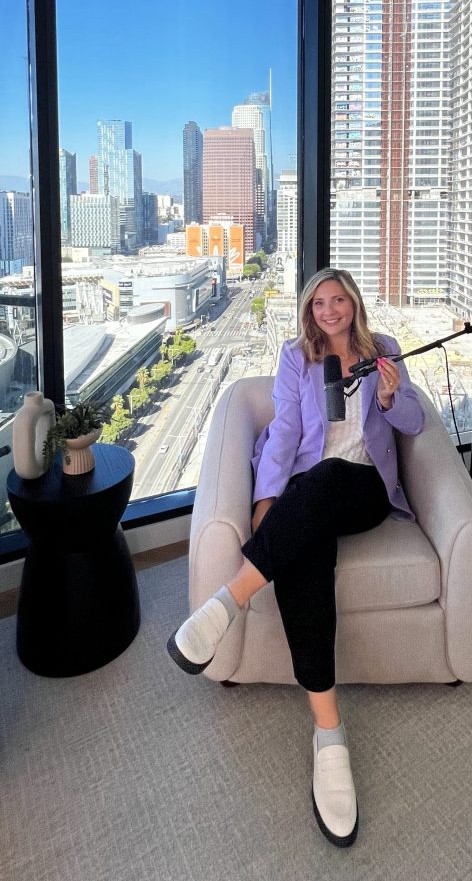
CHS 2013 graduate Emma Schwartz Lara started The Go Abroad Pod, which launched in fall 2024 with her co-host Ashley Warmington. On The Go Abroad Pod, the women discuss all things studying abroad and international education.
The show states: Whether you’re a student dreaming of exploring new cultures and languages outside your home country or a high school counselor seeking to guide students toward unique opportunities, you’ve come to the right place. We’ll explore everything from degree structures and requirements to personal stories and invaluable advice from those who have already embarked on their own adventures. Our mission is to provide meaningful insights and guidance that will make your study abroad experience truly unforgettable.
Building a Podcast
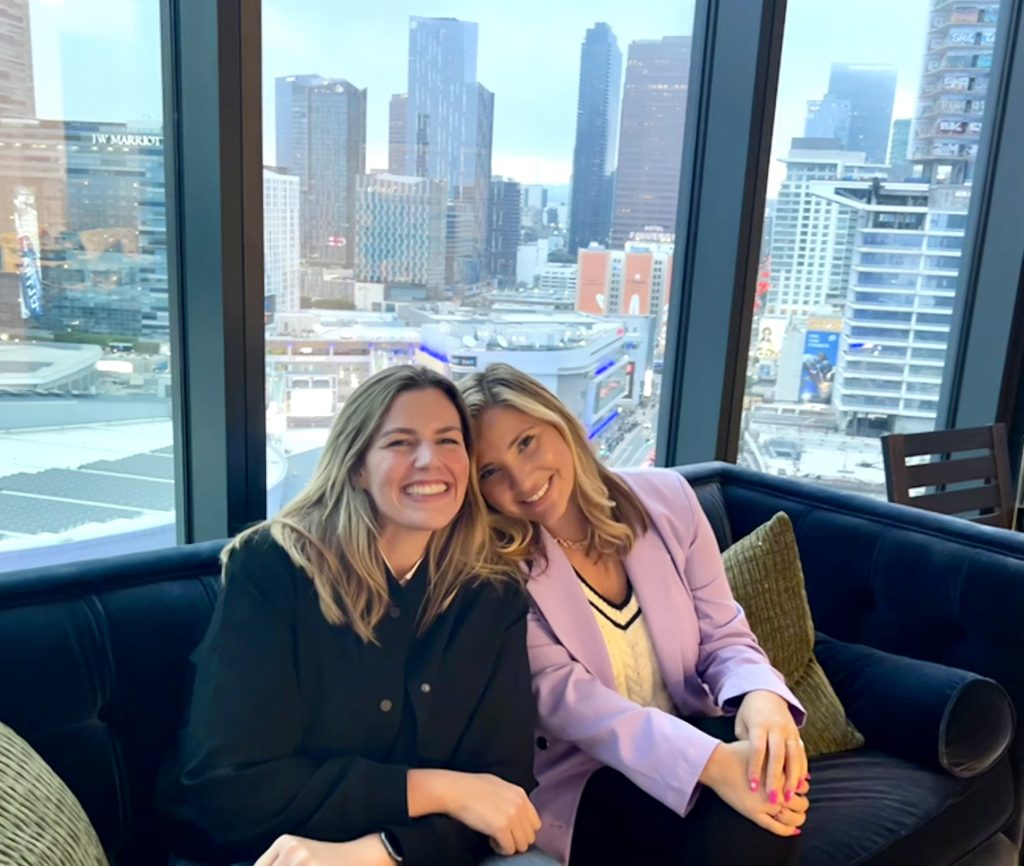
“First and foremost, it was determining what the podcast would be about. It was formulating the idea, getting the information out there, but really getting our niche,” Emma explains about the beginning. Next was getting the right equipment and lining up the guests. The process took about 10 months from inception to releasing the first episode.
As far as the target audience, Emma says, “We want North American students, US and Canadian, to understand what it’s like to go abroad for a full degree. But it’s not only students. It’s all the adjacent people within that industry – international education in general. We want to be a hub for international representatives and counselors at high schools.”
In addition to the two hosts, Emma is proud to have Laura Kondourajian as Executive Producer. “[Laura] works for KCRW in LA, and she’s got podcast-producing experience.”
Emma’s Background
Emma’s appreciation for international travel could be considered hereditary. Her father Martin Schwartz was from South Africa. He studied abroad through Rotary Exchange and was able to explore Ohio. After his program, he remained in America and met Emma’s mother Roberta.
Emma followed in her father’s footsteps and participated in the Rotary Exchange when she was sixteen. “I’m very grateful for the opportunity to go abroad. I went to high school in Strasbourg, France. I was the only American, so I felt like somewhat of an ambassador of America.”
Having an open mind is essential. “I’m very open to new perspectives, and I think you debunk many things that you read in the headlines. It’s not about the headlines; it’s the people deep down. Other students in the exchange group were from Egypt to Sweden to all these different countries, and I was the only American. Yet we all sang to the same music, we were all laughing at the same jokes. We all wanted to have a great time together and learn about France. I just realized that the world is so small. We can paint a better picture when we put ourselves in a position to be somewhat of an ambassador.”
Learn More About The Rotary Youth Exchange Program and Coronado-specific information.
Coronado High School & Beyond
Emma returned from Strasbourg to graduate from Coronado High School in 2013. Following graduation, she went on to earn her bachelor’s from Northern Arizona University. “Northern Arizona is one of the top universities in the country that is outbound for study abroad. My experience at Northern Arizona was really influential; I had great advisors. When you have someone to help and also be student-centric, it inspires you to give back. I also earned my master’s in international education at Northern Arizona.”
While she works on the podcast in her free time, Emma is currently the Senior Regional Manager at America’s James Cook University program. JCU has campuses in Australia and Singapore. Part of her position includes familiarizing schools about international education opportunities. Emma included her hometown of Coronado in this. “I reached out to Coronado High School counselors and said, ‘These are the options for overseas universities and how students can apply.’ Then, it snowballed.” With so much information and misconceptions about studying abroad, Emma knew more had to be done. The podcast was a perfect avenue to facilitate dissemination.
The Go Abroad Pod Season 2
Emma is looking forward to a well-rounded Season 2. After seven episodes in Season 1, The Go Abroad Pod is ready to go deeper and wider in its sophomore season. Emma shares that in upcoming episodes, “We’ll be exploring different regions like Asia and getting to know the admissions processes there and including affordability. To give you a roundabout cost per year, tuition is about $6,500 to $8,500 a year. On the upward, it’s like $10,000 a year.”
As far as guests, it is an impressive lineup. “One guest you’ll hear on the podcast is Anastatia Mayers, who is the youngest woman in space. She’s an 18-year-old philosophy and physics student at Aberdeen University in Scotland. So, not only is she abroad for her full degree, but she also got chosen to go on the Virgin Galactic Voyage to space.” Emma expands, “She’s also a woman of color, and she explains that experience [on the podcast]. There are so many exciting things that she talks about. The people who have gone abroad for their degree – they’re well read and they’re so mature. This woman speaks with such confidence. She’s just incredible. She’s originally from Antigua, and she and her mom went up to space together and met Richard Branson. She talks about that and the worth of the wisdom he talks about to her.”
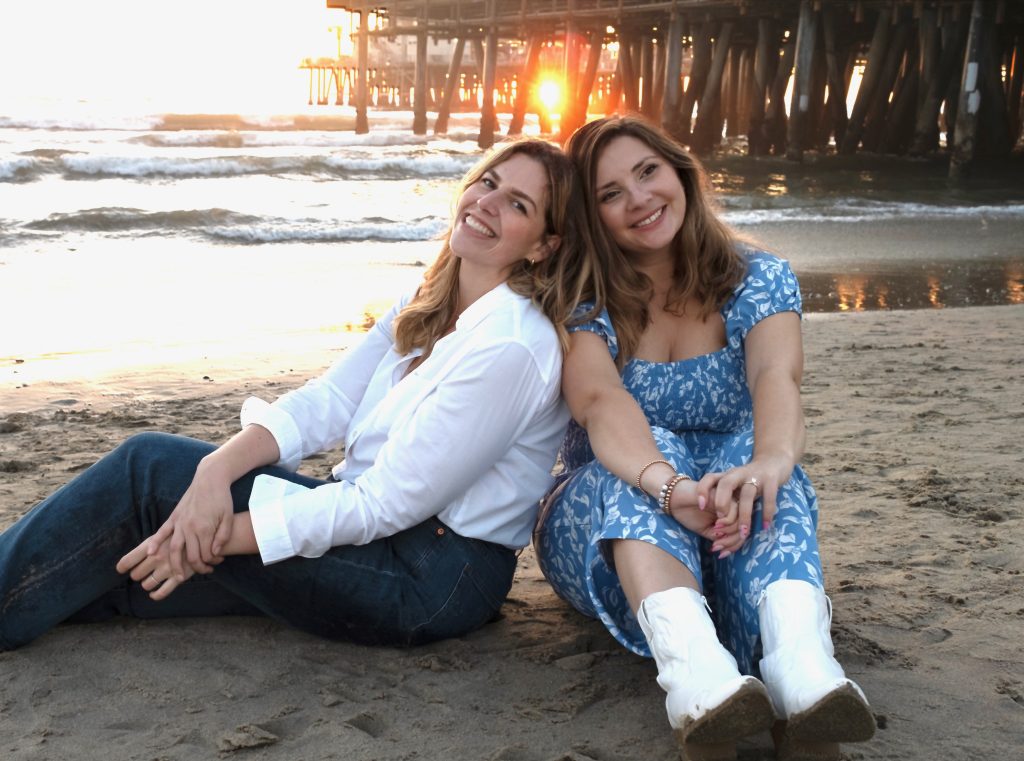
“We’ve interviewed Felicity Lloyd, International Partnerships Manager at UCAS. UCAS is the centralized system people apply to in the UK. It’s basically the Common App of the UK. We’re lucky we got her on.”
You can expect a lot more student stories in season two. “Student stories are really important. This past season, our most listened-to episode was about a student who went to St. Andrews University in Scotland. A lot of prospective students want to hear about the experience. That’s what Anastatia also talks about.”
Continuing, “We’ve also got an Australian perspective, Lea-Anne Allen, Regional Manager at Flinders University. She’s from Australia and she came to recruit in the US. She was the first ever regional-based recruitment manager in California. She started many initiatives for Australian education, for students to go to Australia.”
Another avenue less explored is international athletes. Emma shares, “Many athletes go to the UK for their master’s because they can continue participating in sports. You’ll see women swimmers that were in the Olympics last year. They are graduating with a master’s from a UK institution because they were able to keep playing their sport. We’ll be talking to a man in season two who specializes in sports recruitment for the UK.”
The Different Stages of Life for Going Abroad
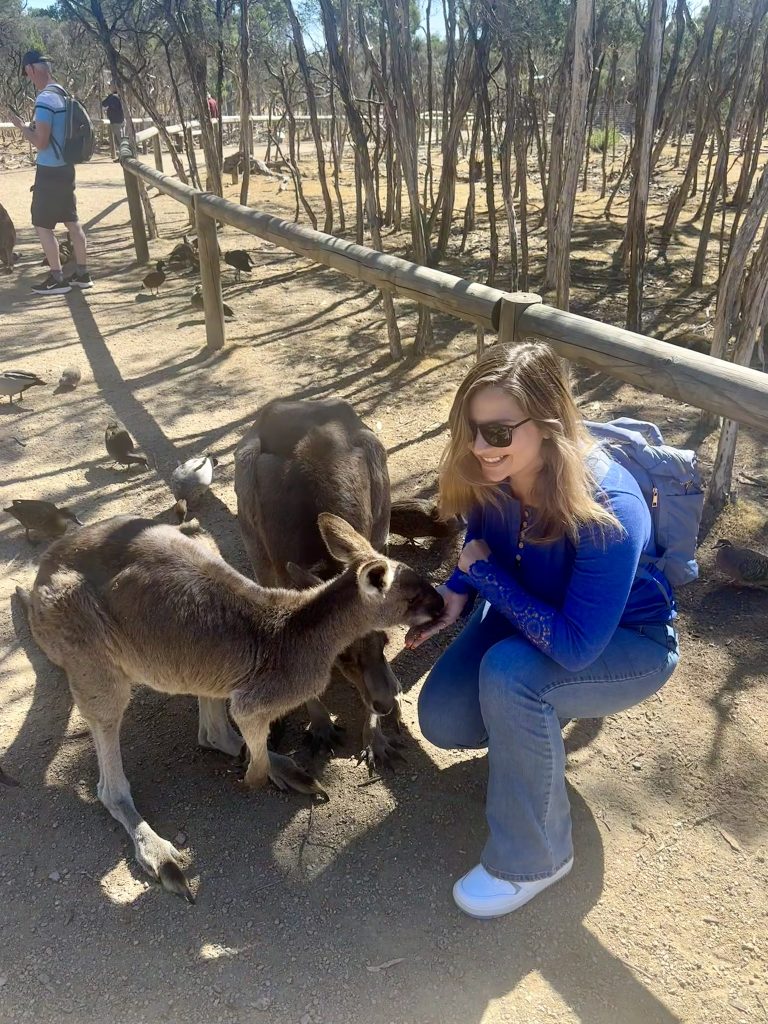
A typical assumption is that a study abroad program takes place for either a year in high school or during the sophomore or junior year of college. Emma weighs in on the “best” time to go abroad and considerations to make that determination.
“It depends on where you want to go and what time of your life. So, if you are in high school and looking to go for a full degree abroad, I think it is easy. In a sense, the admissions process will be very straightforward because you don’t have a holistic review a lot of the time. It’s really based on if you have the academics to get in for the department you’re applying to; then you will get in. Acceptance rates are typically not a thing across other places in the world.”
Emma elaborates, “When you look, [international universities] are transparent on their websites. Going abroad for a full degree can be a lot more transparent and a lot more accessible because of the application process. If you’re applying to the UK, it’s around a $30 application fee to apply to five universities. It’s also cheaper to apply directly to Australia. Most applications are free. These are just examples.”
Merit-Based Acceptance
“The difficulty in some of those merit-based institutions that are top in the world is they will ask for specific AP tests. Often, you might not have taken an AP test, but you took an AP class. There are stipulations, but as long as students do their due diligence in high school, they will know whether or not they’re going to get in.”
Emma explains that although the perceived best times to study abroad are those middle years in college, it is actually a harder time to go abroad. “When you’re going for a full year or even a semester, you have to make sure it aligns with your current degree. That can be difficult, and then you also don’t have as many choices. Sometimes, your university only has certain partner institutions or access to certain universities.”
The financial aspect is also different when you are going as part of your current U.S. university. “You may be in an exchange program where you’re still paying the same tuition that you would pay at home. It could be more expensive than going directly to the school and paying their tuition. It’s dependent on what you’re looking for and the experience you want.”
Gap Year
A strategy that Emma advocates for is a gap year. “There are so many different paths to take. In other countries, it’s very normal to do a gap year because it’s a three-year degree. I don’t feel like there’s anything really wrong with taking a semester or similar off right after you graduate high school, especially if you’re considering going abroad. I feel like there’s so much pressure nowadays on young people to go straight to a four-year university in the states. It’s a lot of money, and it’s also expensive to live here.”
Major-Specific Admissions
 A major difference between national and some international higher education institutions is how the requirements work. “The fact of the matter is that you’re applying to the program. Even if you’re applying to a top university in the UK or Europe, they’re only looking at the subjects that you’e applying to. Let’s say you want to get an English degree, they won’t look at your chemistry grade. You don’t need to be a Jack of all trades.”
A major difference between national and some international higher education institutions is how the requirements work. “The fact of the matter is that you’re applying to the program. Even if you’re applying to a top university in the UK or Europe, they’re only looking at the subjects that you’e applying to. Let’s say you want to get an English degree, they won’t look at your chemistry grade. You don’t need to be a Jack of all trades.”
Emma breaks it down further. “When you go directly from the US to an overseas university, you’re applying to the program, not necessarily the university. For example, if I’m interested in studying marine biology on the Great Barrier Reef, all I need is a 2.5 GPA, and I go directly into studying marine biology. That’s only a three-year degree, but it doesn’t make it any less of a degree. It’s three years, because there’s no general education in other countries. They typically have another year or a different system for their high school.”
Dual Degree Programs
One abroad option that Emma promotes is a dual degree program, which is when you attend an institution for two years in America and then two years overseas. You earn degrees from both universities. Emma points to her alma mater, Northern Arizona University, as an example. “At NAU, they have a dual degree program at Bordeaux University in France. You can study biology and then spend a year abroad. You earn undergraduate degrees from both NAU and the University of Bordeaux. Graduating with degrees from US and European institutions opens vast opportunities for students. I always tell students, ‘If you want to start out in America, look at dual degree programs. Or, if you want to transfer abroad, maybe you start out in a community college, but make sure that you talk to the international university first.’”
Emma ponders when asked about her education and if she would do anything differently given what she has learned now. “I think if I were to go back, I would have skipped earning a bachelor’s in the states, and I would have gone abroad directly from high school. I would absolutely do a degree abroad.”
The Go Abroad Pod & A California Perspective
Emma shares what it’s like as a California native to discover the educational opportunities that exist out of the state. “Ashley and I, being based here in California, are really trying to make sure that students have another option rather than being stressed out to try to get into a UC or the impacted CSU system.
Another way to go abroad is through community college. Emma explains, “Some of the community colleges offer associate degrees in marine biology or oceanography or similar. If you transfer your second-year associate’s degree coursework in marine biology, you could attend an Australian University for two years. It is cheaper than going to UC San Diego. The classes aren’t impacted. You’re really taking a boat out to the Great Barrier Reef. The tuition is about 19,500 a year, and housing is $600. There’s a misconception that you’re paying triple the cost. Yes, you’re paying for the flight. But I think transfer students are a great fit.”
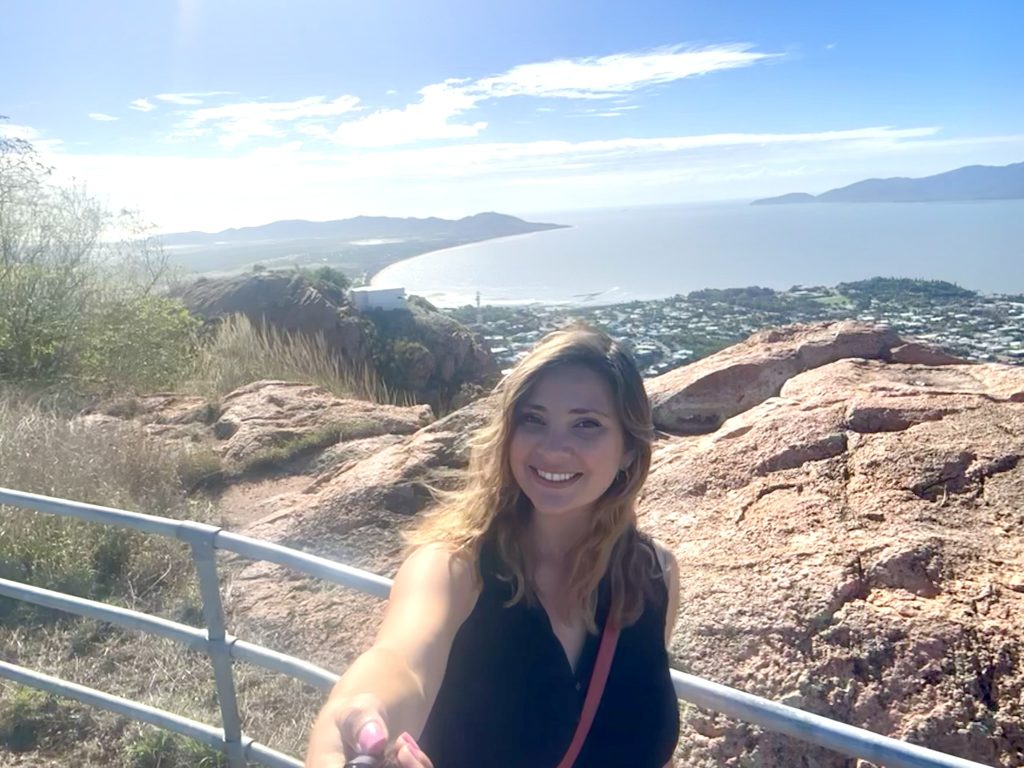
Dreaming Big
Without having the knowledge of how international universities work, students can feel limited. Emma is helping break down the self-imposed barriers, and challenge students to aim higher than they could even dream. “Say you want to do creative writing in Scotland, and you’re going for that major. You’ll have the academics, but you’ll also find that social group.”
They don’t have Greek life, but you can go to Greece for half the price for school.
“You can explore the actual culture. Why not study history, international affairs, or archaeology in Greece? We have American-style Greek life, but you are literally immersing yourself in Greek life. If you are interested in fashion, why not go to Paris? If you are interested in medieval history, go to Scotland or northern England! It’s about following that passion – whatever drives you. I genuinely think the money comes afterward. If you are doing something that is so unique and making connections globally, it will help you. Also, sometimes it’s easier to get into the University of Melbourne, which is ranked the thirteenth in the world than it is to get into your local state college. Going to a top school abroad can be more accessible.”
While it may sound completely out of the realm of possibility, Emma shares that she has had these conversations. “Whenever we talk to a student or a parent, they realize, ‘Oh wow, this is actually a lot better.’ Of course, some universities are very similar to the American style of structure and tuition, but there are only a handful.”
The Go Abroad Pod & Fostering a Positive Experience
Emma’s goal of the pod, in addition to education of the process and experience, is opening up the world to others. Emma says, “This podcast fosters tolerance, empathy, adaptability, and problem-solving skills. These qualities are valuable in both career and life experience. We’re trying to make this more accessible and open up opportunities. That’s the reason why we’re doing the podcast. Who knew that you could go to Japan and earn an English degree for $6,500 a year? They don’t have international tuition; it’s domestic tuition for everybody. It’s about opening the doors for a lot more opportunities. “
Travel Tips
We end the interview with reader-submitted questions for The Go Abroad Pod host, Emma.
Q: What are your best travel tips?
A: I would say download a really good podcast. For material things: a charged phone and your headphones. Also, a good backpack that’s easy to put under the seat in front of you. Wear comfortable jeans and pants. Get a seat back phone holder. Download your Netflix!
Q: Can you work while you go abroad?
A: Actually, the majority do work part-time on their student visa. If you are going abroad for a degree, I recommend focusing on the degree, but you can work on a student visa. Once you get an offer of acceptance to the university, you can get the paperwork to apply for the visa, and the visa gives you the right to work. In the UK, it’s going to be 20 hours a week. In Australia, it’s 24 hours a week; in places like Japan, it could be 28 hours a week. So, it’s a part-time type job that you can undertake, typically on or off campus.
Q: Do you have any tips/hacks on finding hotels and plane tickets?
A: For flights, Skyscanner.com.
For hotels, stick with a hotel chain because you build up points really quickly. There are a ton of rewards programs where you enroll and get double the points. Your nights increase quite quickly. Sometimes you stay two nights, and they give you one night for free. Then you get all these points, and you can stay for free elsewhere. Marriott is a great option for that, because they have Marriotts everywhere around the world.
Q: What is your favorite podcast topic?
A: That’s a hard one. I like sharing the student experience.
Follow The Go Abroad Pod on Instagram.
Listen to The Go Abroad Pod on Spotify & The Go Abroad Pod on Apple Podcasts.




